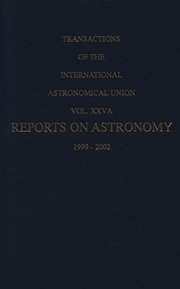No CrossRef data available.
Article contents
Zimbabwe – The Place for Astronomy at the next Total Solar Eclipse
Published online by Cambridge University Press: 25 April 2016
Extract
With clear skies most of the year, low levels of light and industrial pollution and location (we can see 96% of the celestial sphere) Zimbabwe is an excellent place for astronomy. For nearly 100 years a small but dedicated and talented band of amateur astronomers have been making hundreds of observations of occultations and variable stars, and contibuted 10% of the global total of reports to the International Halley Watch. The Astronomical Society of Southern Africa (Harare Centre) is 25 years old and the largest telescopes (mostly ‘home-made’) in the country are owned by members. Active preparations for the next two solar eclipses include site selection, coordination or safaris and free distribution of information packs and over 100 000 eclipse viewers to all schools. If the economy doesn’t collapse, good government and respect for law and order return, the planes keep flying and fuel shortages end, we look forward to welcoming hundreds of eclipse watchers to a dramatic 3 minute spectacle on 21 June 2001.
- Type
- Section 6: Some Practical Matters
- Information
- Copyright
- Copyright © Astronomical Society of Pacific 2001


